Florida keeps trying to kill Betsy Riley.
Riley says it as a joke, a way to make light of surviving three weather-related scares over the past three years. The first time was in 2022, a year after Riley and their partner moved to Alachua County in the northern part of the Sunshine State. On the June day that they brought their then-newborn baby home, a record-setting heat wave overwhelmed the air conditioner until it broke. The next summer, extreme heat struck again, leading to the explosion of a lawn mower’s battery close to where the family’s two dogs were sleeping. Then, this past September, Hurricane Helene sent an oak tree smashing through the roof of their home, bringing a ceiling rafter down on Riley’s partner. Though the branches missed their second child — then 4 months old — by about 5 feet, the infant was showered with insulation foam.
“When I talk about it, I have to keep from crying,” they said. “But you know, nothing stops when you’re a hurricane survivor. You still have to go to work.”
About two months after the hurricane, Riley found themself in like-minded company. As Alachua County’s sustainability manager, the 35-year-old spent a recent Saturday helping lead the inaugural Alachua County Climate Action Summit in Gainesville. Facing a crowd of residents, local leaders, activists, and scientists, one presenter asked, “Who has lived through a hurricane when the power went out?” Hands flew into the air.
Sachi Kitajima Mulkey / Grist
The daylong program was intended to tell the community about climate impacts in store for Alachua County and to get feedback on an official climate action plan, which organizers hope to finalize and begin executing early next year. Within the conference center’s rooms, the atmosphere hummed with urgency, and it was hard to believe that preparing for climate change was at all controversial. For decades, Alachua County has remained a haven for liberals, a blue dot in a deeply red state: Democrats hold most local offices and Democratic candidates for president have garnered landslide majorities since the county backed President Bill Clinton in 1992.
But in Republican-dominated Florida, where Governor Ron DeSantis has scrubbed several mentions of “climate change” from the state’s laws, Alachua County’s ambition looks like an easily popped bubble. Even though a large majority of Floridians say they want action on climate change, the state has become increasingly hostile toward many such policies. Recent headwinds, like state laws written to override local ones, precarious federal funding, and a battle over a local utility threaten to derail the county’s efforts. “To be a Floridian and to be an Alachua County citizen is to hold profoundly different realities,” said Cynthia Barnett, an environmental journalist, in a speech at the summit.
Alachua County sits squarely in north-central Florida, with several hours of interstate buffering residents from coastlines and the nearest big cities, Orlando and Jacksonville. On the day of the summit, downtown Gainesville — the city at the county’s center — bustled with weekend traffic. The city is home to the University of Florida, and some of its 60,000 students were biking to brunch, while others joined throngs of orange-and-blue clad tailgaters in front of the football stadium.
The university is the county’s largest employer, and its progressive influence radiates throughout Gainesville and its 150,000 residents. Leave the city, and the bohemian coffee shops and pride flags vanish, replaced by boiled peanut stands, billboards advertising fireworks, and “Make America Great Again” lawn signs. A little farther, and the Spanish moss-draped canopies of live oak trees give way to farmland and pine forests grown for timber. In this perimeter lie the county’s eight other towns, with populations ranging from less than 1,000 to nearly 10,000.
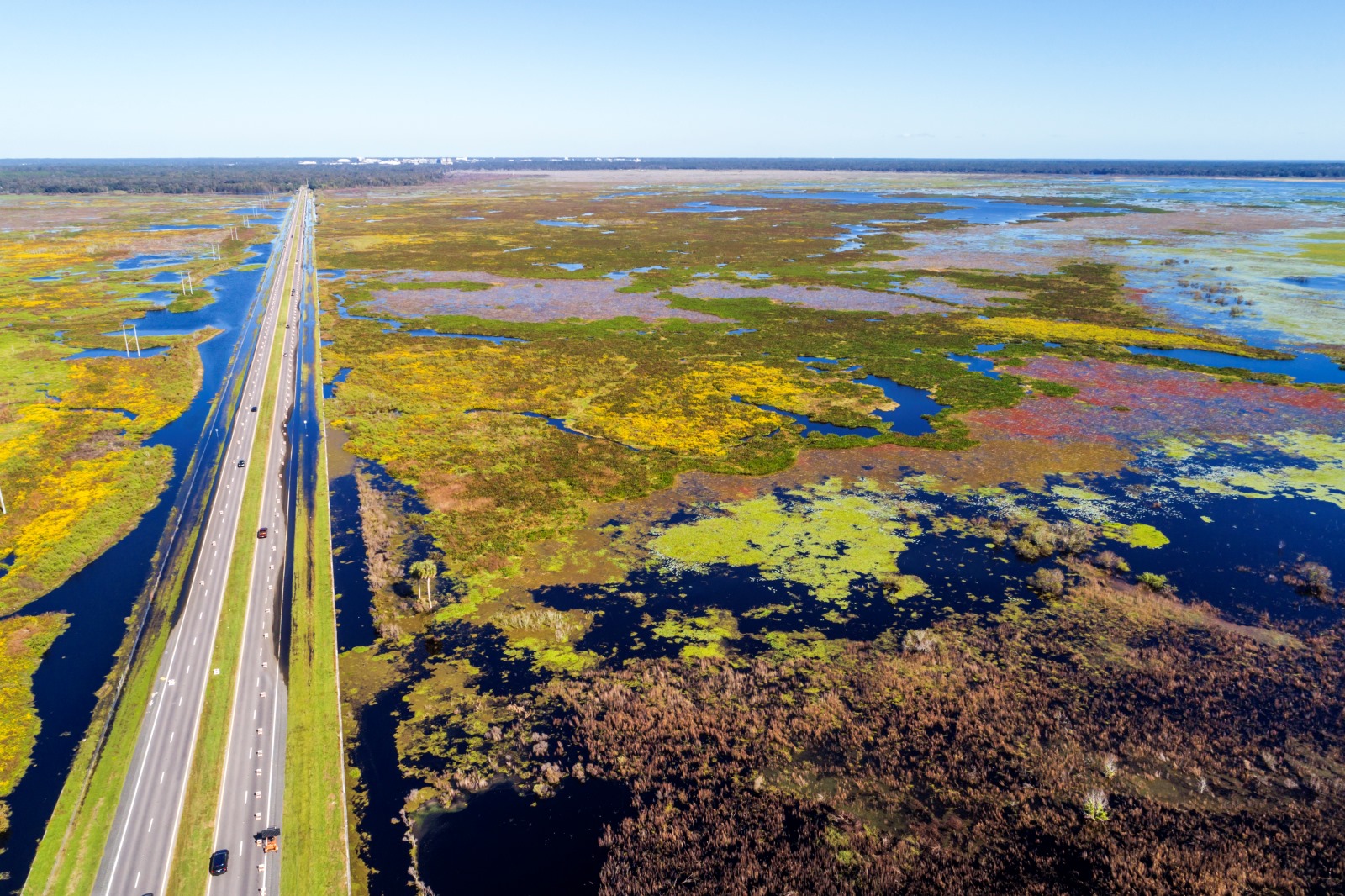
U.S. Route 441 cuts through Paynes Prairie, a state park and nature preserve in Alachua County.
Jeffrey Greenberg / Universal Images Group via Getty Images

A person bikes along a road near the University of Florida campus.
Jeffrey Greenberg / Universal Images Group via Getty Images
Regardless of where Alachua County’s 285,000 residents live, climate change is expected to upend their daily lives. According to the county’s climate vulnerability assessment, finalized this summer, the next century will likely bring a litany of disasters, from intensified hurricanes to long periods of drought. An upswing in extreme rainfall events could flood large swaths of the low-lying region, which is built around wetlands. By the end of the century, residents can expect a heat index, a measure of temperature and humidity, of over 130 degrees Fahrenheit for more than a third of the year.
“It’s critical that we have a climate action plan that considers these future challenges,” said Stephen Hofstetter, the director of the county’s environmental protection department, which organized the summit.
To protect all these people as climate change ramps up, Alachua County is in the final stages of drafting its climate action plan — the first inland county in the state to do so. Gainesville, the county’s largest city, finished creating its climate action agenda in the spring, part of the City Commission’s goal of reaching net-zero emissions by 2045. The two have worked closely together, and each plan focuses on different issues to create a comprehensive series of mitigation and resilience strategies, including establishing more cooling centers, limiting development on floodplains, investing in renewable energy production and electric vehicles, protecting agricultural land, and decreasing waste.
“It’s about maintaining the quality of life for the people,” said Dan Zhu, Gainesville’s chief resilience officer. She hopes that the City Commission formally adopts the plan at the beginning of next year.
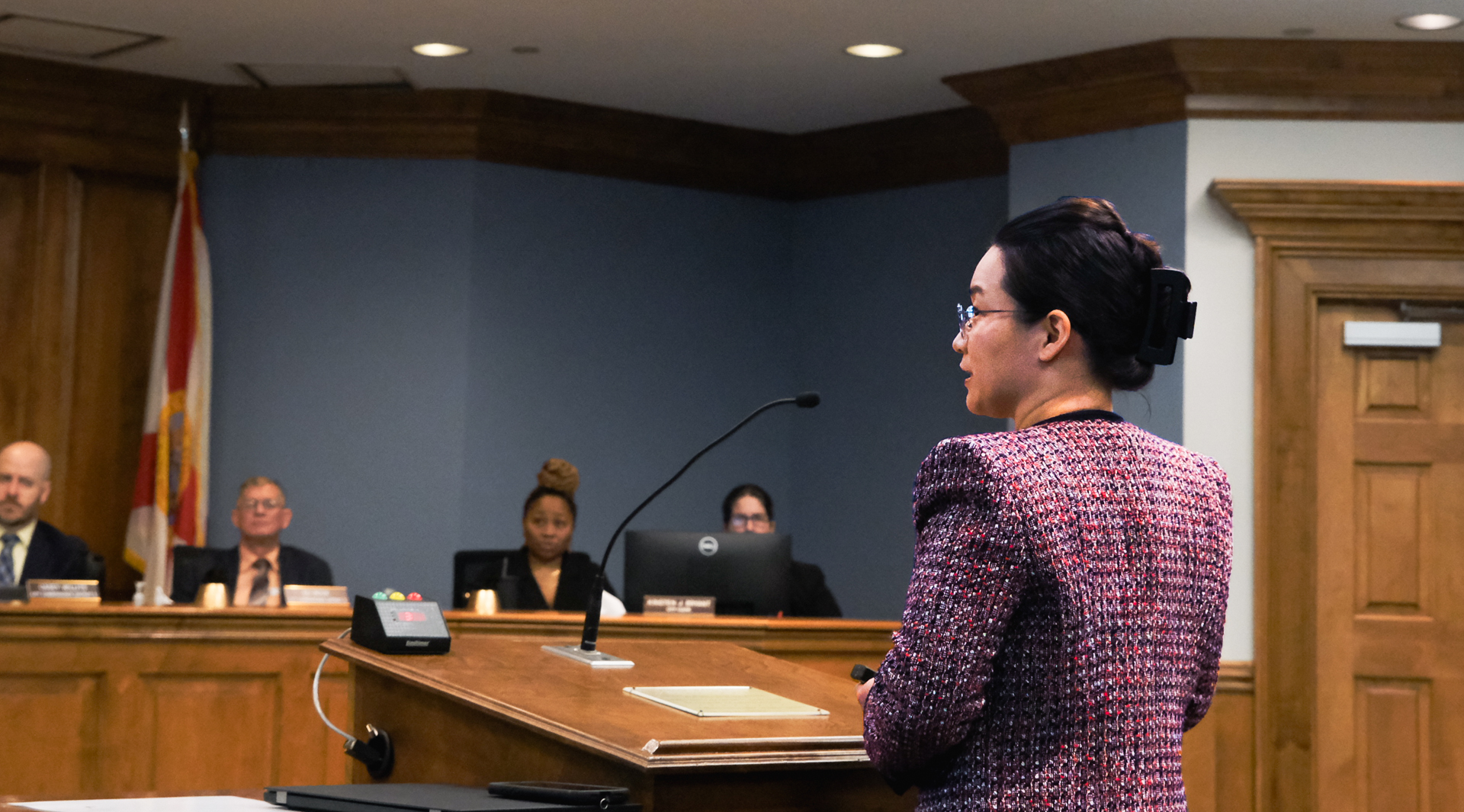
Sachi Kitajima Mulkey / Grist
Alachua County and Gainesville are facing an uphill battle, and it starts with the way they discuss their plans with residents. In May, DeSantis signed a sweeping “don’t say climate change” bill that erased most references to global warming from state laws. The next month, climate change references were removed from textbooks after state officials pressured publishers and school boards to take related content out of grade school curriculums.
The hostile political climate has already undercut the county’s work. The organizers of the climate action summit originally included programming specifically for kids, but after local teachers expressed concerns about getting involved with anything labeled “climate,” the youth portion of the summit was canceled — save for an intergenerational panel with college and high school students.
Other state laws take direct aim at Gainesville. Florida, along with Texas, has recently become a leader in “preemption laws,” state-level bills that block local government laws from taking effect. A number of the city’s climate-minded policies have already been preempted by the state legislature. These include the reduction of single-use plastic, improving energy-efficiency standards in homes, ending restrictive zoning, and increasing the number of EV charging stations.
“You never know when the next shoe is going to drop,” said Bryan Eastman, a city commissioner. To Eastman, Gainesville’s climate work is swept up with other issues in a larger culture war. “Climate’s not the only one, but it’s a big one.”
The state law with arguably the most potential for kneecapping the county and city’s plans was passed in 2023, when DeSantis signed a measure that overhauled Gainesville Regional Utilities, or GRU, the largest utility in Alachua County. The measure took control of the public utility from the City Commission and gave it to DeSantis’ hand-picked GRU Authority board. It also mandated that the city’s utilities be managed with only financial benefits in mind, rather than considerations like climate change and affordability.
“We can’t control our climate action initiatives unless we control our power source,” said John “Ronnie” Nix, a recently retired energy conservation specialist and member of the local citizen climate advisory committee, which works with the city and county’s Joint Water and Climate Policy Board. Gainesville Regional Utilities provides gas, electricity, and water to nearly all of Gainesville. In 2021, 72 percent of that energy came from natural gas or coal. Nearly all the rest comes from a controversial biofuel plant. “We can’t do it without GRU; we need to make it work with GRU,” he said.
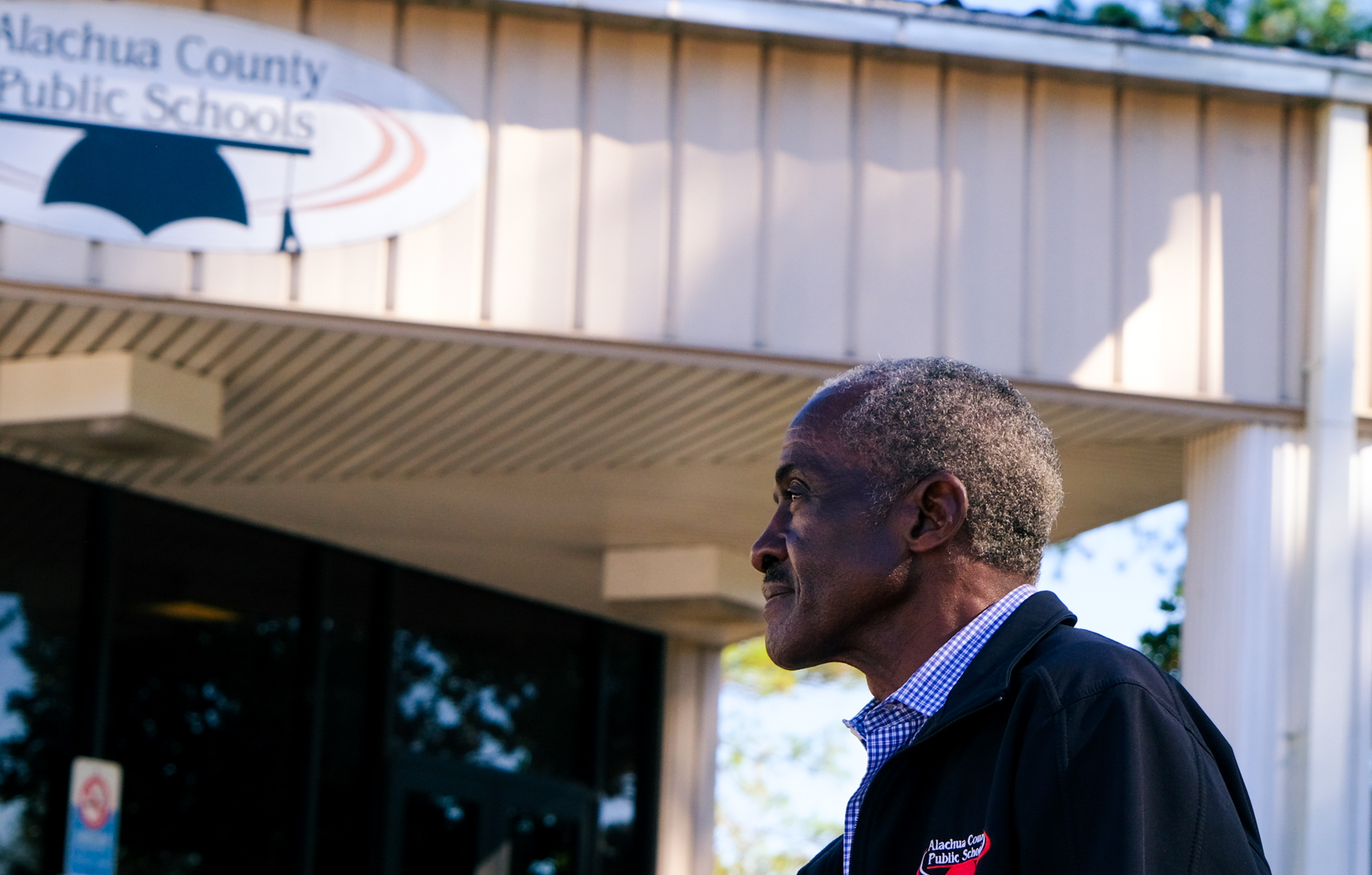
Sachi Kitajima Mulkey / Grist
The utility’s new CEO, Ed Bielarski, eliminated its office of sustainability and reliance a week after the board appointed him in June. Since then, the utility has stopped sending a representative to attend the county’s climate meetings. The board has also reduced incentives for residential solar energy, and cut the utility’s usual contribution to the city budget — typically millions of dollars that fund essential services — by more than half.
During the November election, Gainesville’s voters overwhelmingly backed a ballot referendum to return the utility back to the city, with 72 percent in support. Because the GRU Authority board had challenged the referendum before the vote, a judge is expected to rule in mid-December on whether the city can act on the results. Even if the referendum doesn’t stick, Nix is hopeful that the citizen committee’s efforts to maintain a good relationship with the utility will be successful. A spokesperson from GRU did not respond to a request for comment.
Other utilities in the area may be able to support some of the county’s goals, but funding remains an open question for Alachua County and Gainesville’s climate action plans. The Inflation Reduction Act, the U.S.’s largest climate bill, allocated money for renewables and cleaning up pollution when it was passed in 2022, but DeSantis rejected the money, blocking local governments from accessing it. And while the city can apply directly for some federal grants, it hasn’t always been eligible.
“Gainesville has been missing out on a lot of funding, because we’re not big enough,” Riley said, explaining that some federal climate funding is earmarked for cities of a certain size. In other cases, the city was required to show it had a climate action plan in its grant application. Now, just as the plan is nearly ready, Donald Trump’s return to the White House with Republican control of Congress means any unspent funds from Biden’s climate law will likely wind up elsewhere. “The timing couldn’t be worse,” Riley said. “The scale of what we can accomplish is going to be so much less.”
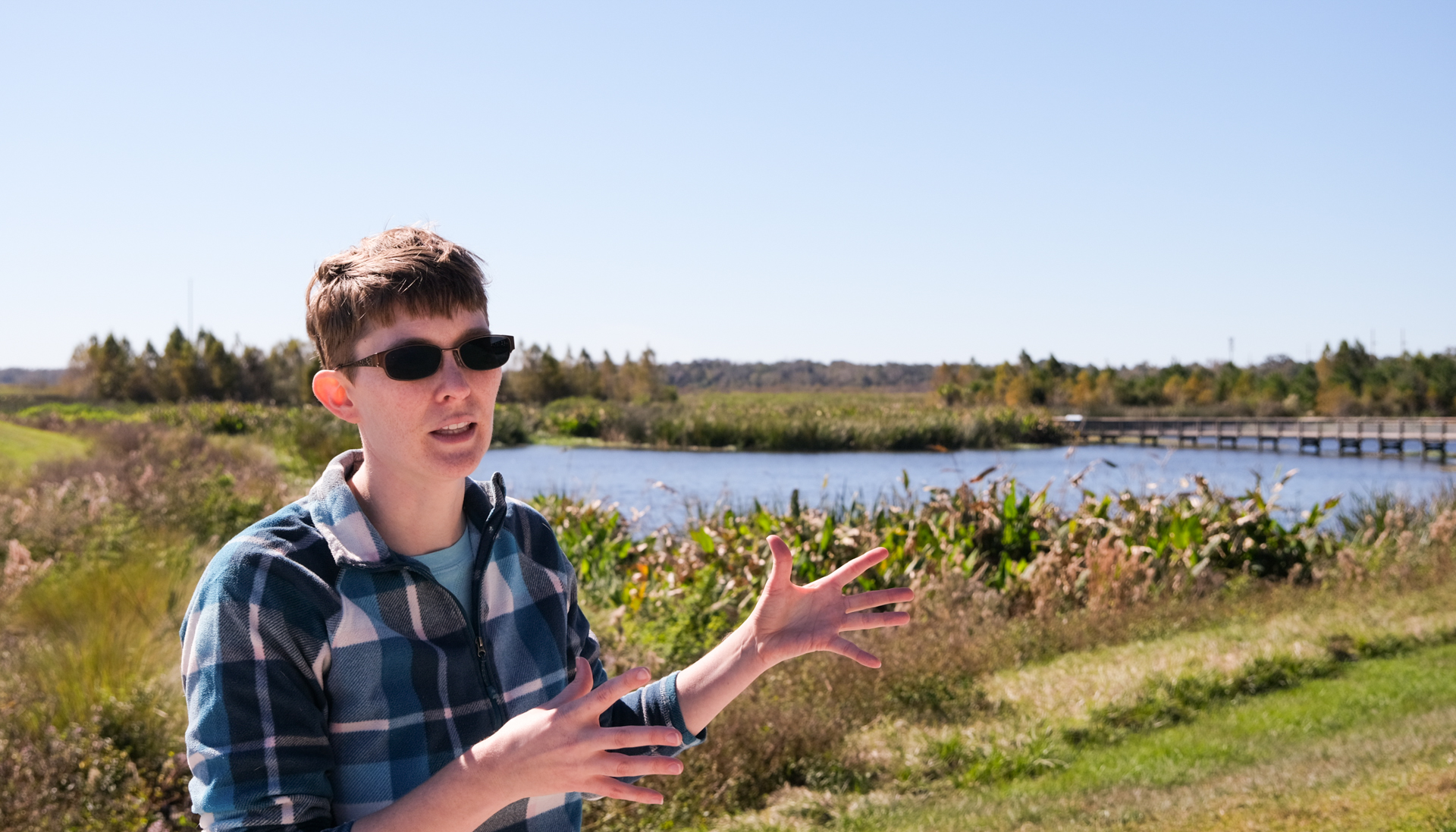
Betsy Riley speaks with Grist about Alachua County’s climate action plan at Sweetwater Wetlands Park, one of Alachua County’s 11 nature preserves.
Sachi Kitajima Mulkey / Grist
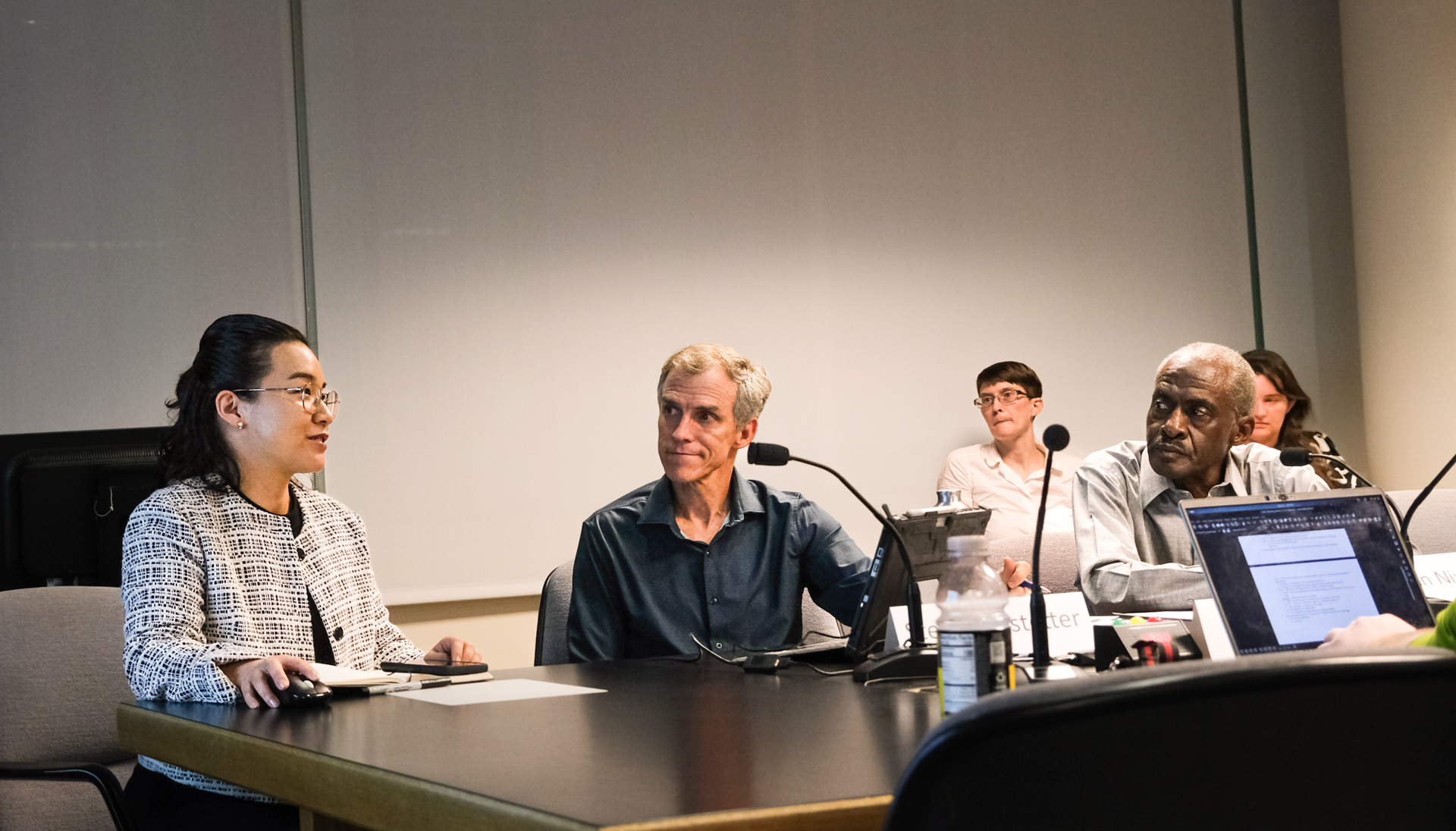
Stephen Hofstetter, John Nix, and Betsy Riley listen to Dan Zhu present an update to the Gainesville Climate Action Plan during a Citizen Climate Advisory Comittee meeting.
Sachi Kitajima Mulkey / Grist
While local proponents of climate action acknowledge the coming years won’t be easy, many are self-described optimists, scattered to various corners of city government and community organizations. Hofstetter hopes that the economic benefits associated with renewable power will encourage the federal government and utility to embrace it, while Zhu points out that key parts of Gainesville’s plan are already underway, like the rollout of electric buses, bolstered by federal grants.
Alachua County residents have also been taking action on climate change on their own. Last spring, the University of Florida Student senate passed a Green New Deal, a first of its kind in the nation. The Community Weatherization Coalition, a local group that started in a church, has spent decades helping low-income neighborhoods fortify homes to be more energy efficient. It’s also part of a larger collaboration creating a community solar project for the county. Other organizations, like the local Sierra Club chapter, have tried to nudge the utility’s new board toward solar energy as a cheaper alternative to gas.
Riley also sees an opportunity for building public support for the plan in more conservative parts of the county by exchanging the word “climate” for less politicized synonyms. “Words really matter, but it’s about doing the work,” they said. In the town of Hawthorne, located in the far east corner of Alachua County, organizers ended up holding a sustainability and resilience summit instead of a climate one earlier this year. Zhu’s title also recently changed from “chief climate officer” to “chief resilience officer.”
Nix, who speaks to churches on behalf of the climate action committee, says that once people understand how preparing for climate change can protect them, they have no problem with using the word “climate.”
“The best way to communicate climate impacts is to meet people where they are,” he said. “Find out how it impacts them. Get them to feel it’s personal. People will work a little bit harder to do the small things that they can.”
Source link
Sachi Kitajima Mulkey grist.org

